
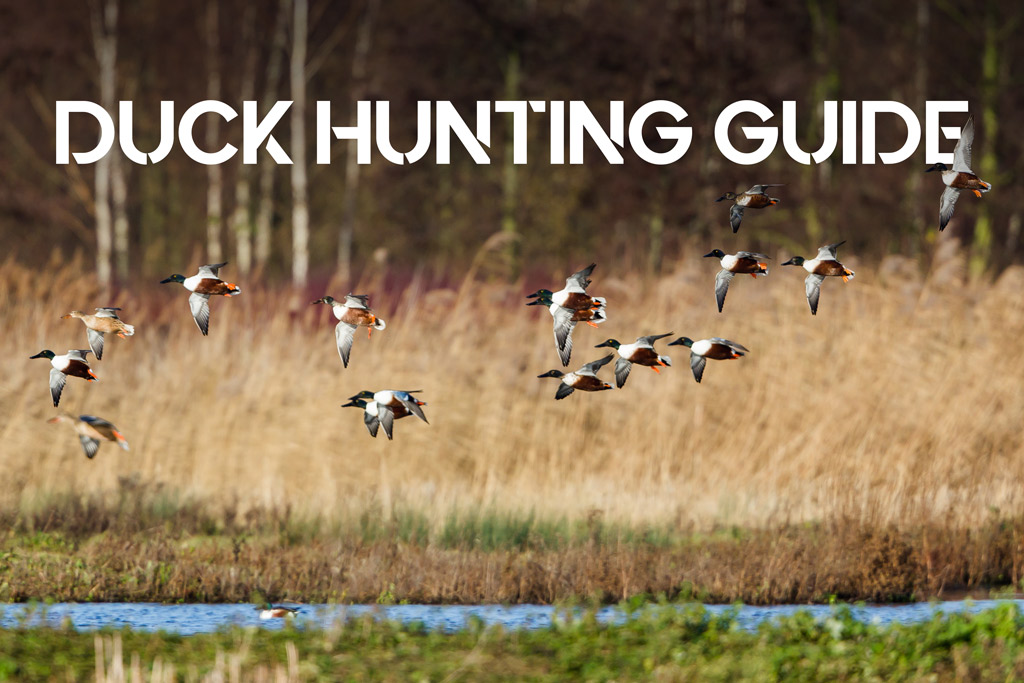
It’s a Saturday morning, about 6:45 AM. I’m sitting in my homemade duck blind. It’s basically a lean-to made from an uprooted tree, some dead limbs, and evergreen branches. Ahead of me are a dozen or so duck hunting decoys, to the left of me is a thermos full of coffee. I have my dog and a trusty 12GA pump ready. I can already see some ducks flying in the distance, so excuse me while I make a few calls.
Can you imagine a better way to start a long weekend? I sure can’t.
Duck hunting is one of the simple pleasures in life, and it should be one of yours. It combines the patience of deer hunting, the interactive nature of turkey hunting, and the action of upland bird hunting all in one hunt.
I usually tell my audience that hunting is simple and affordable, however, duck hunting is a different breed. The laws are constantly changing, there are different species with different season dates plus bag limits, and the gear adds up.
Now, I am not telling you this to scare you away from duck hunting, because you should try it. I am hoping to teach you the basics of duck hunting, so you can ease into the sport and get a good foundation without breaking any laws, or your bank account.
Understanding Ducks
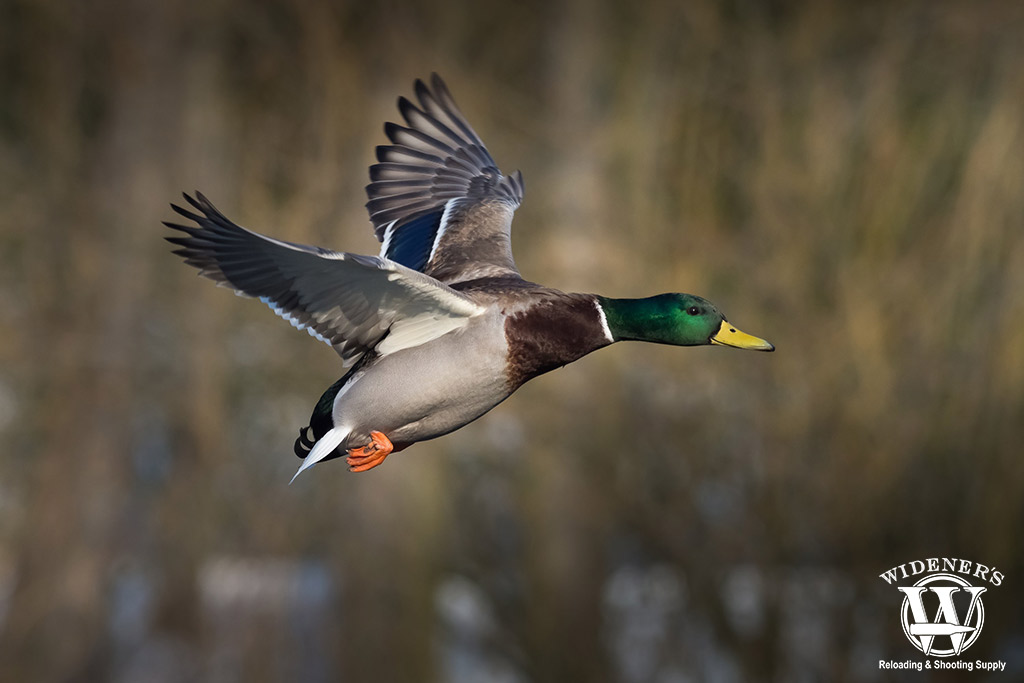
With over 100 species, ducks can be separated into two basic categories, diver ducks, or puddle ducks.
There are over 100 different species of wild ducks. But, you can lump most of them into two categories. Diver ducks and puddle ducks. Both have unique features and are common throughout the United States.
Diver ducks include Goldeneye, Black Scoter, Canvasbacks, Hood Merganser, and so forth. The Diver duck is an omnivore, which means they will feed on underwater vegetation and animals. Diver ducks are built to be on the water. When they take flight they run across the water and gradually ascend into the sky, much like a plane.
Puddle ducks include Mallards, Teals, Wigeons, Woodies, Pintails, Shovelers, and more. Puddle ducks are omnivores as well, but they mainly feast on vegetation, plants, and crops. They’re comfortable on water and land, so it’s not uncommon to see them away from the water- think about the ducks your grandparents feed at the park. Puddle ducks will explode straight out of the water when taking flight.
Here is a list of diver ducks to help ID the birds you are seeing.
Here is a list of puddle ducks to help ID the birds you are seeing.
The Flyways
Most game species are regulated by the individual state, which means the state’s wildlife department will set season bag limits, huntable zones, dates, and so forth. However, since ducks migrate within the U.S., as well as outside of the US., the Federal Government regulates ducks. Duck regulations can vary each year and by the flyways.
Ducks are regulated through four different flyways, which are the Pacific, Central, Mississippi, and Atlantic. Each flyway has different laws, bag limits, season dates, and so forth, so know your fly zone. Because ducks are regulated by the federal government you will need to buy a duck stamp. Duck stamps can be purchased at Post Offices and some states offer electronic duck stamps that print right to your state license. To my knowledge all states still make you purchase an additional state license to hunt ducks, although this is usually only a couple of bucks.
Here is a map of the flyways.
On The Hunt
As you can see this is a lot of information, and it can make duck hunting complicated and even intimidating. Each year you’ll have to familiarize yourself with season dates and season limits, bag limits per day, and zones. Not to mention you will need to be able to identify the species of a duck and gender, all within a few seconds of a duck getting into shootable range.
Ducks Unlimited is a great site to get duck hunting information. I am a member and will continue to be. They do great work restoring and preserving wetlands and wildlife.
Duck Hunting Gear
Let’s talk about how duck hunting can get expensive. I try to make all my hunting gear versatile, meaning my deer gear is good for turkey, my pheasant gear is good for grouse, and so forth. Except for my base layers, all my duck hunting gear is strictly for duck hunting.
Depending on where you hunt and how seriously you take duck hunting, you’ll eventually find yourself needing waders, jackets, gloves, decoys, decoy rigs, decoy bags, multiple calls, and of course, a lanyard. This is just a simple list. I will discuss more below, but you should try to buy the gear as you progress in the sport. If you get serious about duck hunting it can be costly and the gear adds up quickly!
Gun Recommendations
A 12 gauge rules supreme when it comes to duck hunting. That’s not to say you can’t use a 20 gauge, but shots at ducks are usually done from a little way out and they are big, hearty birds with a delicious layer of fat. So, I opt for a 12 gauge for a little extra power.
Any 12 gauge will work, but most people use pumps and semi-autos because generally speaking the barrels are longer and the guns are heavier, which helps when using large duck loads. To this day I still use my Mossberg 500 and love it.
Duck Hunting Ammo
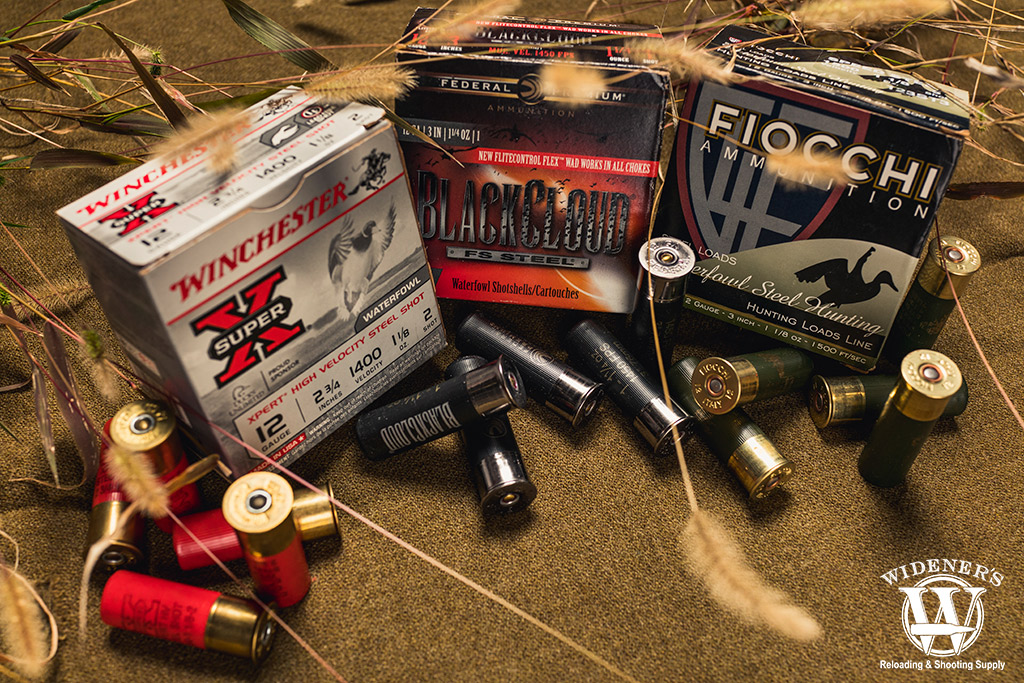
Almost all ammo manufacturers offer a lead-free 12-gauge shotshell hunting option.
When hunting ducks you need to use lead-free rounds. In certain states you can’t even store lead shells in your hunting truck. Trust me, my buddy got a citation because he had a half box of 8 shot lead in his truck a mile away from our blind. Check your state regulations before heading out on a hunt. Because of this I keep most of my duck gear in a tote and will load it into the bed of my truck before hunting. That tote holds an ammo box inside, which only contains non-toxic rounds.
Actually, I rarely use lead, because a few years ago I was grouse hunting outside of my camp in New Hampshire. I came upon this small stream that was loaded with Woodies, my favorite… However, I only had lead shot on me, so I needed to pass. Ever since this incident, I started to only hunt upland birds with non-toxic shells.
I use #2-4 shot on ducks. My favorite rounds are Hevi Shot Tungsten, Federal Speed Shok, and Winchester Drylok Super Steel. I have never had an issue with any of these shells.
How To Duck Hunt
Unlike most hunters, I didn’t come from a long line of hunters, pretty much everything I know about hunting I taught myself. If you are reading this article I am assuming you don’t know any experienced duck hunters who could help you out. So, I want to tell you how I progressed from knowing nothing about ducks, to getting my fair share every season. It is not a quick process, but it worked, and I gained knowledge and confidence.
I am an avid upland bird hunter and do a lot of pheasant hunting in flooded cornfields, marshy areas, and fields. These areas are loaded with waterfowl.
One day, I met a guy in the field who was setting up goose decoys, we got to talking and he told me about Ducks Unlimited. I went home and started reading the articles and going on their forum (sadly, it has been taken down.) It was at this time, I decided I wanted to try duck hunting.
What To Look For
Trouble was I knew I couldn’t identify every duck I saw. I decided to go to the pheasant field and try getting some ducks or geese that passed by. However, I gave myself two rules A) only Mallards and Canadians Geese B) Only two of each. I picked these birds because I knew without hesitation I could ID these birds. I set the limits because I was only allowed two females at the time and I wasn’t confident in my ability to call the right gender in the sky; secondly the laws were a foreign language to me, but I knew two birds were well within my legal means. I did this for two seasons or so.
Eventually, I moved on to jump shooting ducks and if you don’t bird hunt you can start here. Jump shooting was the most fun I have ever had duck hunting. I would go on Google Maps and look for small streams, marshes, or wetlands and walk the area hoping to spook, or “jump”, some ducks. During this time, my only real investment in duck hunting was a pair of knee-high rubber boots.
Helpful Rules
At this stage, I felt more comfortable about the legal bag limit of mallards, identifying mallards, and even started to hunt wood ducks. But, I also gave myself some rules:
- If I saw duck hunters set up in a blind with decoys, I would walk away.
- If I saw a deer hunter, I would walk away, normally in the opposite direction.
- I would only shoot ducks over water that was no deeper than knee-high, this way I knew I could retrieve all my ducks.
This stage taught me the most about duck hunting, such as seeing different ducks (which I would go home and research), areas in which ducks are located, and the ability to find duck holes on a map. I did this for a season or so, and still will catch myself today veering off a grouse hunt looking to jump shoot some woodies.
Experience In The Field
The next season, I invested some money into some decoys and a call that I found. Then I would go out for sunrise and sunset to the areas in which I had the most luck jump shooting ducks the previous season. I would toss the decoys out and make some simple calls. I’ve had some luck and learned a few things, such as less calling is better and fewer decoys are better when hunting small holes. As I got better at calling, I learned to identify birds coming in, and perfected my decoy spread. I did this for a long time, never really wanting to invest in waders or a kayak.
A few seasons later, I started to take duck hunting a lot more seriously. I purchased waders, a jacket, and gloves all made specifically for duck hunting. I also cross-trained my dog in waterfowl hunting. In addition, I started to build blinds out of dead trees, stumps, and evergreen branches. This is the stage I am in now and although I am far from being a member of the Robertson family, I am a decently successful duck hunter.
Learning To Fly
First off, I learned duck hunting doesn’t have to be a huge expense. I used my upland gear for a while with great success. Jump shooting ducks can be done by almost anyone and is a great way to break into duck hunting.
Secondly, I learned what type of ducks I wanted to hunt and where I wanted to hunt. Personally, I only like to hunt puddle ducks, with mallards and woodies being my favorites, this is strictly because I think they make the best table fare. I also like to hunt small bodies of shallow water. I never got into the big lakes, flooded timbers, or rivers. Although many prefer this, it wasn’t my style.
Finally, I gradually built confidence with duck hunting. Each year I would hunt a different species or feel more comfortable taking my legal limit. Additionally, I slowly built up a respectable amount of quality duck hunting gear.
All and all, I think my progression from rank novice to a solid intermediate took me five years. But, keep in mind I am an avid upland bird hunter who spends more time chasing pheasants and grouse than ducks. If I devoted an entire season to duck hunting it probably would have only taken me a year or two to get proficient.
Duck Hunting Tactics
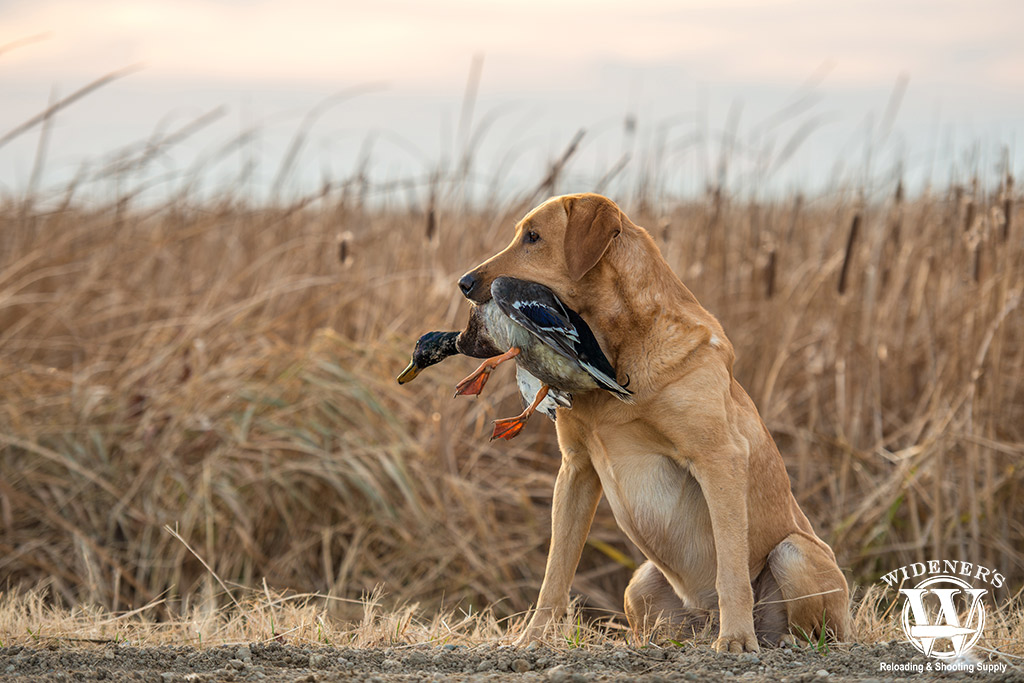
When duck hunting remember, less is more. Everything you carry with you into the hunt has to be carried back out again, plan accordingly.
I’ve shared my progression with you, but let me offer some basic tactics that may help.
Less is more with duck hunting, this applies to calls and decoys. As I mentioned above I used to crowd my area with decoys and ducks never flew in. I noticed when I only had a couple of decoys out, I actually saw more ducks flying in.
Same with calls. Too many people call too much and use these advanced calls they saw on TV. Stick to the basic quacks and use them infrequently, you’ll improve your luck.
Watch ducks in the water, you’ll get an idea of how they communicate, how your decoy spread should look, and their overall habits.
Finally, buy quality duck gear. Waders, jackets, decoys, and so forth take a pounding. I made the mistake of buying some cheap waders online and they only lasted a season, due to rips. Then the very next season I got another pair of waders, which broke. Finally, I spent a few hundred bucks and got nice waders which have lasted three years now.
Table Fare
Wild duck meat gets a bad rap, people complain it is gamey, liver(ish), and tough. However, if cooked properly wild duck is delicious. I recently saw a video where Steve Rinella sums up 90% of the issue with game meat. People either A) cook it too long or B) don’t cook it long enough. This is true with duck, because people think of it as traditional fowl, like chicken. Duck meat is red and should be treated like filet mignon, not chicken. Which means it should be cooked medium-rare.
Another issue with ducks, is hunters often breast them out, leaving behind the delicious layer of fat. Don’t do this. Spend some time plucking your birds and you’ll see waterfowl fat is amazing. On really fat birds, I will render out the fat and use it to fry potatoes.
There are three ways in which I cook 99% of ducks, roasted or smoked whole, or grill the breast. Duck pairs well with fruit, so I like to stuff the bird with fruit or serve alongside a fruit chutney, acorn squash, or fried potatoes. I also save the carcass and bones to make duck bone broth. This is a good base for soups, stews, and gravies.
Duck Hunting Made Easy
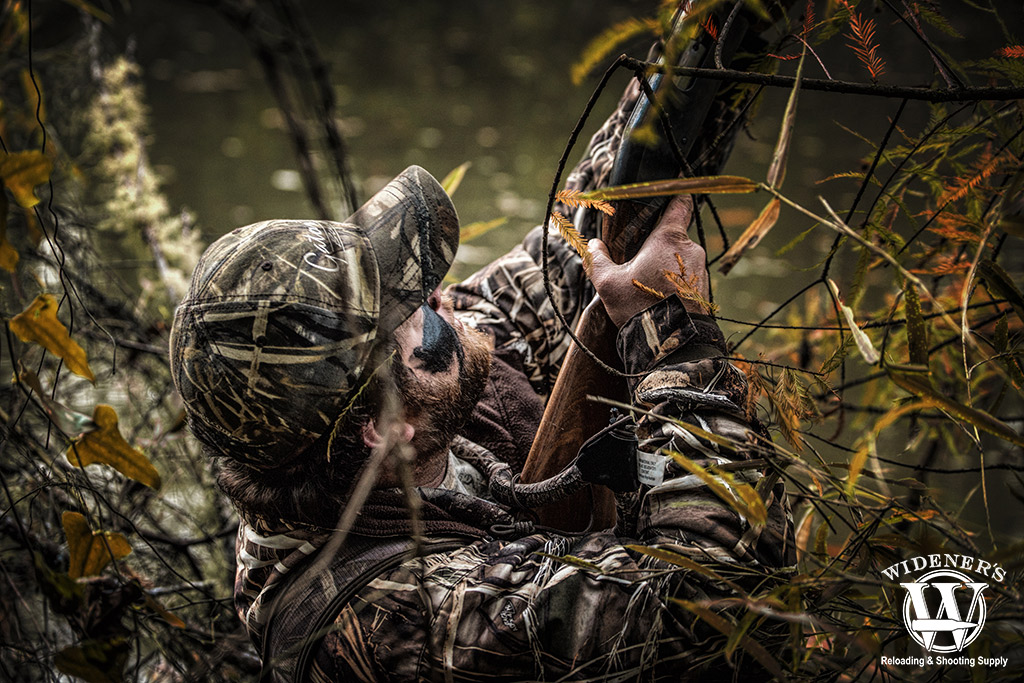
If you’re just getting into duck hunting, take it slow. The best experience comes from getting out in the fields and learning the sport.
If you don’t personally know an experienced duck hunter, I recommend you try my progression into the sport. Like everything else in life, you really need time in the field to master duck hunting. You can ease into it, without spending all of your hard-earned money. If you know an experienced duck hunter, ask if you can tag along and just buy him a sixer at the end of the day.


